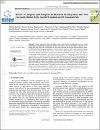Review of Progress and Prospects in Research on Enzymatic and Non- Enzymatic Biofuel Cells; Specific Emphasis on 2D Nanomaterials

View/
Date
2022-12-12Author
Geetha, MithraSadasivuni, Kishor Kumar
Al-Ejji, Maryam
Sivadas, Nandagopal
Baig, Moghal Zubair Khalid
Promi, Tamanna Jannat
Ahmad, Sumayya Ali
Alabed, Sara
Hijazi, Dima Anwar
Alsaedi, Fatimatulzahraa
Al-Shaibah, Faozia Nasser
...show more authors ...show less authors
Metadata
Show full item recordAbstract
Energy generation from renewable sources and effective management are two critical challenges for sustainable development. Biofuel Cells (BFCs) provide an elegant solution by combining these two tasks. BFCs are defined by the catalyst used in the fuel cell and can directly generate electricity from biological substances. Various nontoxic chemical fuels, such as glucose, lactate, urate, alcohol, amines, starch, and fructose, can be used in BFCs and have specific components to oxide fuels. Widely available fuel sources and moderate operational conditions make them promise in renewable energy generation, remote device power sources, etc. Enzymatic biofuel cells (EBFCs) use enzymes as a catalyst to oxidize the fuel rather than precious metals. The shortcoming of the EBFCs system leads to integrated miniaturization issues, lower power density, poor operational stability, lower voltage output, lower energy density, inadequate durability, instability in the long-term application, and incomplete fuel oxidation. This necessitates the development of non-enzymatic biofuel cells (NEBFCs). The review paper extensively studies NEBFCs and its various synthetic strategies and catalytic characteristics. This paper reviews the use of nanocomposites as biocatalysts in biofuel cells and the principle of biofuel cells as well as their construction elements. This review briefly presents recent technologies developed to improve the biocatalytic properties, biocompatibility, biodegradability, implantability, and mechanical flexibility of BFCs.
Collections
- Biological & Environmental Sciences [944 items ]
- Center for Advanced Materials Research [1666 items ]
- Central Laboratories Unit Research [129 items ]
- Pharmacy Research [1492 items ]

